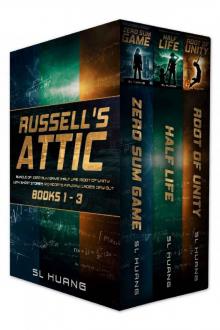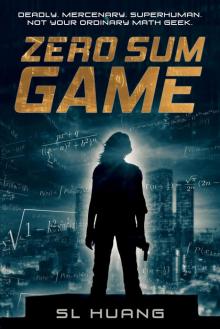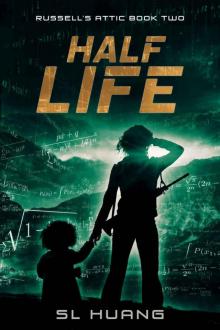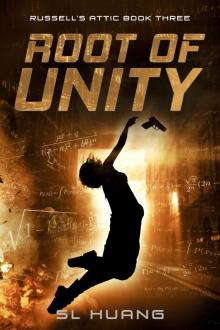Zero Sum Game Read online
Page 4
Maybe I could turn her guilt to my advantage, I thought. Come at her from the side, maneuver her into revealing whatever she was hiding—
The thought was exhausting. I wasn’t any good with people, and I definitely wasn’t good at subtlety. I could threaten her, but…
Courtney rubbed the ends of her sleeves across her face, sniffling.
She was just a kid. Or near enough. Even I wasn’t willing to go there, at least not yet.
I picked up the file from Anton and the paper bag of money with stiff hands, and we got out of the car. The alleyway ended at a rusted back door; I led the way up a narrow, dark stairwell that climbed into a dilapidated second-floor loft. The furnishings were basic: mattress in the corner, some boxes with food and water in them, not much else.
I dug through one of the drawers in the kitchenette area where I remembered having thrown medical supplies and unearthed a bottle of expired sleeping pills, which I tossed at Courtney. “Here. Take those and get some rest.”
“I don’t like drugs,” she said unhappily.
I didn’t comment on the irony of that.
She swallowed the pills dry and stumbled over to the pallet in the corner. “Where are we?” she slurred, the drugs already kicking in.
“A safe place,” I said. “I have a few around the city. Keep them stocked, in case I need to lie low.”
She cocked her head at me for a long moment, smearing her sleeve across her face again, her eyes glazed. “You’re scary.”
Her frankness took me aback. “You hired me to get you out of all this, remember?”
“Yeah, I guess,” she mumbled. “I wish…” She was already starting to slump into a doze, her exhaustion combining with the pills.
“What do you wish?” Maybe, with her half-conscious state, I could get her to tell me something she otherwise wouldn’t have.
“I wish I didn’t need someone like you,” she said, and her eyes slid closed.
Yeah. Sure. I was the bad guy here.
I left my client a docile, snoozing form on the blankets, grateful for the respite. My stupid body was starting to feel the last thirty hours, but I rummaged through the drawers again and found a box of caffeine pills. I ached for a shower and a quick nap, but first I needed to see if I could put together what Anton had found—what he might have died for.
The file was thin. I pulled the lone stool in the flat up to the kitchenette counter and opened it, turning over the first few sheets of disconnected information and wondering how I would make sense of them, only to be hit in the face by a blandly unassuming document: a funding memo from the Senate Select Committee on Intelligence. I sat and stared at it, feeling as if someone had kicked my legs out from under me.
Pithica was a project. Possibly a highly classified government project. I closed my eyes, trying to get a grip. It could be anything, I told myself. The United States has any number of operations the population doesn’t know about; it could be anything. Anything…
I saw lab coats and red tile in my mind’s eye. Whispers of weapons and a better future. I slammed down on the vision before my imagination ran away with me.
It could be anything.
There was a reason why I stayed off the government’s radar. Why I didn’t like the police, why I willfully ignored the law, why I didn’t have a Social Security card, why—unlike Anton—I refused to pay taxes, aside from the obvious. The government scared me. Too many secrets. Too many bits of darkness I’d seen hints of over the years.
People with that much power…too big. Too dangerous.
Too real.
What was I getting into?
I forced myself to keep looking through the other documents. The Senate memo only referenced the word “Pithica” incidentally, as if the mention had slipped in by accident, and included no details on the mission of the project or who might be running it. I rifled through the rest of the pages: a report of an investigation into California dock workers’ conditions, marked with a post-it that said it had come up in cross-referencing; a transcript from a radio transmission with half the text blacked out, giving no clear reference points; another memo with the phrase “Halberd and Pithica”—Halberd must be another project, but I found no other mentions of the word…
A few other documents turned up similarly frustrating bits and pieces. The file proved Pithica existed—or had existed; the most recent document dated from more than five years ago—but nothing more. Underneath the last page was a note in Anton’s blocky handwriting: “Should be more. Dead ends. Scrubbed? Will keep digging.”
The papers had no reference to Colombian drug cartels or anything else connected to Courtney Polk, and no hint of why the LAPD—or any other local police force, for that matter—would be looking into this.
I sat back. What did I know? The dirty cop chasing after us had expected me to have information on Pithica. He had followed us from the compound, which meant the cartel was involved somehow, and he had also said that if I didn’t talk, then he’d expected Courtney to be able to answer his questions.
Why? As far as the cartel’s chain of command went, Courtney Polk had been rock bottom. What did the cop think she knew? If this was about drugs, why had the cop come after her rather than anyone higher up?
And who were the people who’d been at Courtney’s house? The suits and the way they operated had screamed government-type, which fit with what Anton’s intelligence had revealed, but at least two of them had been European. What had they wanted from Courtney?
Every piece of this mess pointed back at my skinny twenty-three-year-old and her hard luck story. Either Courtney Polk had lied to me from the first moment I met her, or a whole slew of people, from the dirty cop to the Dark Suits, were mistaken about her importance.
And I knew someone who might be able to tell me which it was. Someone who could give me an idea whether I should be protecting my new charge or pulling a gun in her face and demanding answers. Someone who, if Courtney was more than the naïve kid she seemed, might have had ulterior motives about sending me on this mad chase in the first place.
I picked up the phone.
“I said don’t get involved,” said Rio flatly by way of greeting.
“Answer me one question.” I glanced over to the corner, where my would-be client was curled up into a ball and wheezing lightly in her sleep. “Did you have some other reason for sending me after Courtney Polk?”
Heavy silence deadened the line. Then Rio said, “Who?”
Chapter 5
I hoped the line we were on was insecure as hell, and that Rio knew it and was answering accordingly. Otherwise…otherwise, someone had been playing me like a fucking marionette. “We need to talk,” I said. “Now.”
“Camarito,” Rio said. “Main and El Zafiro. Midnight.”
Camarito was a small town near the compound I’d pulled Polk from the night before. “I’ll be there,” I said, and hung up. My skin felt itchy and too-tight all of a sudden, as if a thousand hidden eyes were watching me.
Rio had been willing to make a meeting, which meant our phone call wasn’t compromised—at least, not to his knowledge. Which meant he hadn’t contacted Dawna.
Who had? Dawna Polk was a middle manager at an accounting firm. She wasn’t exactly well-connected to the criminal underworld. It was very like Rio to decide her sister needed out—he judged people, decided what they deserved, and made it happen, and I had no trouble believing he would have disinterestedly come to the rescue of a scared kid suffering from one bad decision too many.
If Rio hadn’t called Dawna, however, then someone else had a motive for rescuing Courtney—and this mystery conspirator had kept me from being suspicious of the job by using Rio’s name. Which meant said unknown person not only knew way too much about Rio and me and our strange not-friendship, but was one hundred percent aware of Rio’s cover.
Rio was compromised. I felt sick. Our conversation would have tipped him off, and he could take care of himself, but still…
&n
bsp; I picked up the phone again and called Dawna’s work number.
Her secretary answered, and hemmed and hawed about her boss being in a meeting, but apparently Dawna cared a lot more about her sister than whatever she was doing at work, because mere seconds later her voice came fast and breathless over the line. “Did you find her? Is she okay? Oh my God—did they hurt her?”
“She’s fine!” I raised my voice to cut in over her frantic queries. “Fine! She’s sleeping right now.”
“Oh—Ms. Russell, I don’t know how to thank you. I just—she’s my little sister; I can’t—thank you—”
“Yeah, okay, okay.” I had trouble squeezing a word in. “Dawna, we need to meet. Your sister—she might have gotten in deeper than she realized.”
“I don’t under—what happened? Is she still in danger?”
“We’ll talk in person,” I said. I didn’t want to give away too much—the way this case was going, someone was probably listening in on Dawna. Or following her. “Remember the coffee shop where we met before? Meet me there in an hour.”
“I—of course—of course I will. Will Courtney come? Can I see her?”
“Not yet.” No way I would let Courtney out into the world before I had a better handle on the situation. “It’s better if she stays here for now. She’s safe here. I’ll see you in an hour.”
“Oh—yes, of course,” Dawna said, her words tumbling into each other. “I’ll be there—and thank you—”
I hung up on her.
Courtney was still out cold. I did a quick differential equation, my eyes measuring her body mass, and figured she’d be gone for a while—three hours at the very least, probably a lot longer. Enough time for me to make it to Dawna and back.
Still…
A couple of naked pipes ran along the base of the wall next to the mattress. I pulled the handcuffs back out of my pocket and locked one side around a pipe and the other side loosely around one of the girl’s scrawny wrists. Then I stuffed some cash and other supplies in my pockets and pulled a .40-caliber SIG Sauer from behind the false back of one of the kitchen cabinets, replacing it with Anton’s file and the rest of the paper bag of money from Polk’s place.
I borrowed a motorcycle from a nearby parking garage, one with a layer of dust that told me the owner had last ridden it forty-two days ago, plus or minus a few hours. Probably a rich guy who took it out for a spin every few months; he’d never miss it. The helmet clipped to it was two sizes too big, and I made a face as I put it on—I don’t crash. But I also couldn’t afford to get the highway patrol on my tail. Stupid California and its stupid fascist helmet laws.
Motorcycles are a joy to ride in LA traffic. I wove between the cars, zipping past long lanes of stopped vehicles and leaning into a tight curve to fly up the ramp onto the freeway, frustrated motorists idling in line behind me. Widths and speeds and movement danced in front of my eyes as I rocketed the huge sport bike through spaces that didn’t look wide enough for a cat to slip through, dipping and looping around other drivers and gunning between them down the asphalt, an untouchable point in motion.
On the bike I made it across town in thirty-four minutes, which would have been impossible in a car. I also managed to find parking on the street in Santa Monica, which likewise would have been an exercise in futility for a larger vehicle—I squeezed in against the curb behind a little Honda, not worrying myself about the niceties of a legal parking space. My friend I’d borrowed the bike from would be the one to see the fallout from any tickets.
I was early, but my client already sat at a table waiting for me, somehow looking both relieved and tense at the same time as she fiddled with the strap of her purse and ignored the cold paper cup of coffee in front of her. Dawna Polk looked nothing like Courtney, and with her height and fine bones and Mediterranean coloring, she could have been beautiful…except that she wasn’t. She was…worn, and faded, and looked like someone who stared glassily at tedious minutiae all day in a featureless cubicle where she let her personality leach slowly away.
Yes, said a taunting voice in my head, drinking your way through life is so much better, isn’t it? Hypocrisy, thy name is Cas.
Dawna leapt up when she saw me, almost knocking her purse off the table. “Ms. Russell!”
“Dawna,” I greeted her. “Walk with me.”
She jerked her head in a rapid nod and scooped up her belongings to trot after me, tottering slightly as she tried to hurry in stupidly high heels. “Where are we going?”
“Somewhere else. I need to make sure you weren’t followed.”
Dawna’s eyes got wide, and she came with me without any more questions.
I led her down a few bustling, crisscrossing streets, surveying the trendy crowds of midday shoppers in all directions and staying alert for watchers and tails. A few blocks over, I took a sharp right into another coffee shop with a mostly empty sit-down section. A hipster on a laptop in the far corner was the only other customer; knowing Los Angeles, he was probably working on the next Great American Screenplay.
“Sit down,” I said to Dawna, dropping onto one of the chairs at a small wooden table as far as possible from the other patron. The rich smell of brewing coffee mingled with warm baked goods made my stomach start a riotous clamor about not having been fed; I pulled out an energy bar I had pocketed back at the loft and tore it open. A lanky young employee made a hesitant movement toward me as if he were about to say something, but I glared at the kid, and he meekly turned back to wiping tables.
I pulled out a little electronic gadget I’d also grabbed when I’d dropped off Courtney and pushed a button on it as I chewed. A light flashed green, which meant it wasn’t picking up any electronic interference likely to be a bug. I let my eyes flick around the shop, measuring distances and figuring sound propagation in air; the lone employee had gone back behind the counter and the laptop-engrossed hipster wasn’t close enough to eavesdrop over the folksy wallpaper music. Excellent.
Dawna watched me anxiously, not asking questions. She wasn’t the curious sort. “How is Courtney?” she said at last.
“I left her right after I talked to you,” I said. “So, sleeping. She’s fine, like I said.”
Her fingers clasped at each other in worried little twitches of movement. I realized she was literally wringing her hands. I’d thought that was a figure of speech. “When can I see her?” she asked.
“When I figure out what’s going on here,” I said evenly.
“What do you mean?” Her eyes were wide and frightened.
“Dawna.” I lowered my voice, even though we had already been speaking quietly. “Tell me everything about how you knew to contact me.”
Her forehead wrinkled in confusion, but she obeyed anyway. “A—a man called me.” She swallowed, as out of her depth as the first time she’d told me the story. Dawna Polk was not a woman built for uncertain times. “He knew my name. He told me Courtney—” She lowered her gaze to her nervous hands, blinking rapidly. “He said if I wanted my sister to live, I would—I needed to get her out. He was very convincing.” She shivered. “He gave me your phone number, said to call you and tell you—to tell you Rio had sent me.”
“What did his voice sound like?” So far she hadn’t said anything she hadn’t told me in our first conversation, when she’d initially contacted me.
She gave a tense little half-shrug. “A man’s voice? What—what are you asking?”
“Any accent? Distinctive pitch? Anything?” Jesus, I needed something. If Dawna couldn’t give me a clue, I was at a dead end.
“No. It was very flat.”
Which did sound like Rio, but it also could have been someone else. Someone meaning anyone. “Can you remember him telling you anything more specific? Anything might be helpful.”
“He said—he said they would kill Courtney if I didn’t—” She started to tear up. Honestly, woman, get a hold of yourself. “He said you were very good, that you were the only one who could save my sister. He said to pay what
ever you asked.”
Well, that had been nice of Not-Rio.
“I knew she’d been taken,” whispered Dawna. “The police, they interviewed me about what happened. The news stories about the cartels, what they do to people—the police wouldn’t help; they already thought she—” Her voice broke. “I was scared to go to you, but if I hadn’t and Courtney had—I couldn’t bear that.”
Yes, yes, I was such an intimidating person. Dawna had given me exactly zero new information. “Aside from the drug stuff, was Courtney mixed up in anything else?”
“Of course not!” Fire flooded Dawna’s eyes. “My sister is a good person! How could you even think—?”
“Okay, okay, I get it.” This interview had been useless. The woman didn’t know a damned thing.
“Ms. Russell.” Dawna reached out, taking me by surprise, and grasped my hands in her own slim, birdlike ones. “Please. What’s going on? I thought Courtney was safe.”
“She is. Now. But…” I sighed. “It turns out my friend Rio wasn’t the one who called you. There may be more going on here than we thought.”
“What are you going to do?”
In spite of myself, I felt sorry for her. “I’m meeting with Rio tonight,” I said, trying for a soothing tone. “I’ll see if he knows anything. And then we’ll figure out why everyone is after your sister.”
Dawna’s eyes widened further. “Everyone? After her?”
“Well, we know why the cartel is and why the cops would be, but I think someone else…” I frowned. “Dawna, have you ever heard of something called Pithica?”
She shook her head. “No. What is it?”
“I don’t know yet. But some people think Courtney’s involved in it.”
“Who? The cartel?”
“The cops. Or at least, a cop we…ran into. I don’t know about the cartel.”
“And this Pithica thing, it’s…bad?” hazarded Dawna anxiously.
“Considering people seem pretty willing to kill her over it, yeah.”

 Russell's Attic, Books 1 - 3
Russell's Attic, Books 1 - 3 Zero Sum Game
Zero Sum Game Half Life (Russell's Attic Book 2)
Half Life (Russell's Attic Book 2) A Neurological Study on the Effects of Canine Appeal on Psychopathy, or, RIO ADOPTS A PUPPY: A Russell's Attic Interstitial
A Neurological Study on the Effects of Canine Appeal on Psychopathy, or, RIO ADOPTS A PUPPY: A Russell's Attic Interstitial Root of Unity
Root of Unity